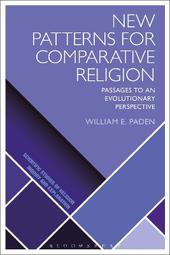
|
New Patterns for Comparative Religion: Passages to an Evolutionary Perspective
Hardback
Main Details
| Title |
New Patterns for Comparative Religion: Passages to an Evolutionary Perspective
|
| Authors and Contributors |
By (author) William E. Paden
|
| Series | Scientific Studies of Religion: Inquiry and Explanation |
|---|
| Physical Properties |
| Format:Hardback | | Pages:264 | | Dimensions(mm): Height 234,Width 156 |
|
| Category/Genre | Comparative religion
History of religion |
|---|
| ISBN/Barcode |
9781474252102
|
| Classifications | Dewey:200.9 |
|---|
| Audience | | Undergraduate | | Postgraduate, Research & Scholarly | |
|---|
|
Publishing Details |
| Publisher |
Bloomsbury Publishing PLC
|
| Imprint |
Bloomsbury Academic
|
| Publication Date |
19 May 2016 |
| Publication Country |
United Kingdom
|
Description
The cross-cultural study of religion has always gone hand in hand with the worldview, sciences, or intellectual frameworks of the time. These frames, whether focused on psychology or politics, gender or colonialism, bring out perspectives for understanding religious behavior. Today one of our common civic worldviews is represented in the shift from scriptural to evolutionary history. This volume brings together in one place key essays by professor emeritus William Paden, showing a progression of steps he has taken in exploring bridgeworks between comparative religion and evolutionary models of religious behavior. One of the leading scholars in religious studies, Paden shows ways that religion can be contextualized as part of the natural world and thus seen as reflecting the ingrained sociality and world-making drive of the human species. Paden argues that although comparativism has been challenged as too culture-bound, too western, or too gendered, cross-over categories and concepts between religious traditions cannot be avoided. Arguing that there are recurrent patterns of human behavior common to our species and that thereby underlie all cultures, he proposes that the missing link in the Religion Evolution debate is comparative religion, a global, cross-cultural perspective on religious behaviours throughout time. Each article is contextualized within this overall trajectory of thought within Paden's work and the history of the discipline as a whole.
Author Biography
William E. Paden is Professor Emeritus of Religion at the University of Vermont, USA. He was Religion Department Chair for 22 years, and is author of Religious Worlds: The Comparative Study of Religion (1988, 1994) and Interpreting the Sacred: Ways of Viewing Religion (1992, 2003).
ReviewsThis collection of essays, even if not representing a single, standardized theory of religion, offers a remarkably coherent whole which includes suggestive propositions for moving the comparative study of religion forward and to integrate divergent approaches. * Entangled Religions * A methodological goldmine, New Patterns for Comparative Religion offers a new paradigm for the comparative study of religions in which 'the enterprise of comparison...is perhaps our greatest claim to originality as an independent academic discipline' (139). This thought-provoking work is recommended for university and community college libraries with substantial holdings in the study of religion. Graduate students and professors of religion will find this title of interest as well. * Reading Religion * Paden provides a valuable and nondogmatic glimpse into the current state of the scholarly domain of comparative religion and succeeds in addressing some of the field's important hermeneutical tensions while offering inventive heuristic tools in an erudite and laudable manner. * International Journal for the Study of New Religions * The essays selected for this volume invite the readers to join a series of engaging conversations with key theoretical questions in the study of religion\s. These forays into various theoretical environments avoid hegemonic discourse, opening up interrelated perspectives on important aspects of the eco-sphere of religion. -- Michael Stausberg, Professor of Religion, University of Bergen, Norway This remarkable set of essays recounts Paden's efforts to renew the comparative study of religion by placing his earlier emphasis on world making on an evolutionary footing. In focusing on behavior as a bridge between disciplines and recasting "worlds" as environmental "niches," he points the way to a more robust comparativism. * Ann Taves, Professor of Religious Studies, University of California at Santa Barbara, USA *
|